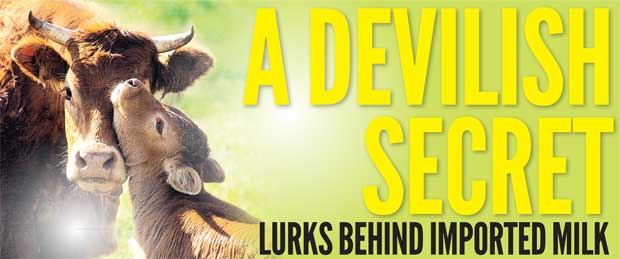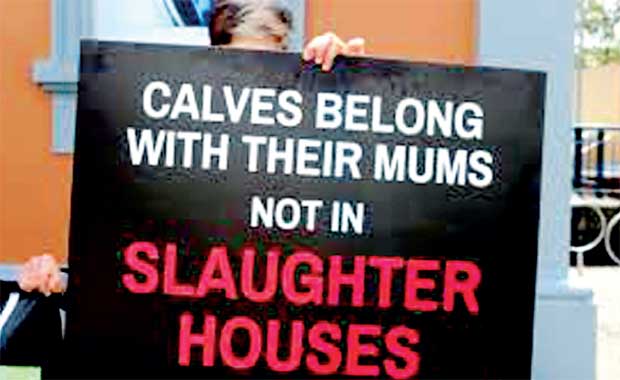Reply To:
Name - Reply Comment
Last Updated : 2024-04-19 00:03:00

Today, in Sri Lanka, a predominantly Buddhist country, many people avoid eating meat, especially beef. In the distant past, aversion to any food produced after taking an animal life was more marked than now and meat stalls of any type were seldom seen in operation during that time. Among some Buddhists this ‘hands-off’ extended even to a taboo in eating eggs because ‘they contained chicks in the process of development’. This trend resulted in the term ‘Buddhist’ eggs that referred to eggs  produced in farms that raised only hens or layers to produce eggs. (No cockerels are found in layers’ cages.) Consequently there was no possibility of eggs getting fertilized- so Buddhist eggs.
produced in farms that raised only hens or layers to produce eggs. (No cockerels are found in layers’ cages.) Consequently there was no possibility of eggs getting fertilized- so Buddhist eggs.
To eat or not to eat beef (and other meats) has been a subject of argument among Buddhists. One group was of the opinion that it was permissible because beef or meat came from a dead animal–a carcass– while another group pointed out that animals were being killed because there was a demand for their flesh.
In comparison to the consumption of chicken and other meats, the boycotting of beef among Buddhists is much more widespread especially in village areas where rural folk rear cows for milk and bulls to draw carts and for paddy field work. The love and care they extend to the one or two cows that provide milk for their children come from their hearts. When such animals get old and dry up, no-one thinks of selling them to a butcher. “How can we do such a thing to an animal that provided us so much? Let them be around and when they die we will bury them” is the usual response when questions are asked about their plans for ageing cows and also bulls. Calves are similarly loved and cared for. Admittedly there are some who think that the maintenance of a non-productive cow or calf is too costly. Such people take more drastic steps in getting rid of such uneconomical and troublesome burdens.
The availability of fresh milk to consumers in this country is nowhere near the demand; hence, the need to import powdered milk in huge quantities into the country. And such milk as everyone knows is pricey and it seems importers do not think twice in demanding price hikes. In such a well-orchestrated monopoly, government finds its hands tied because the country depends on imported milk to meet their needs. However, questions have been raised about the quality of imported powdered milk. Concerns of substances tainting such milk powders have made the news in the past. But such negative impacts soon died down for various reasons. And, people still wanted milk.
A practice that has gained ground among Buddhists is the release of cattle destined to be slaughtered in an abattoir. Singly or in groups, people buy such animals destined to die and hand them over to families that are willing to care for them.
Fairly recently, one of the companies importing powdered milk (from Australia or New Zealand or both as far as the writer knows) and selling them here in value added packs under their own brand name was seen advertising them in conjunction with their programme in saving cattle from butchers. It cannot be denied that it has made praiseworthy progress in saving cattle from slaughter.
Now here comes the crunch. Is this company and others importing powdered milk aware of what takes place routinely in dairy farming in Australia and New Zealand that export huge quantities of milk to Sri Lanka. (This does not mean that milk producing countries like the UK, Europe, Canada, and the United States among others are not open to such criticism. They are as vulnerable to the same charges.)
"Where is the Buddhist voice in this ‘Buddhist’ country? Why are animal rights activists in Sri Lanka so silent on the issue? In what manner is the government hoping to handle this two-facedness in this issue?"
The gross manner in which dairy farms are managed in Australia and New Zealand as commercially operated units has drawn severe criticism from people in those countries as well as international groups. It is well known that cows come into milk in their cycles of calving optimized at around 6. Over that ideal, it is not considered economical to maintain cows because their milk yields drop. Consequently to maintain levels of profit as determined by farm owners, cows are artificially impregnated practically annually according to time tables of coming into heat. Such drastic practice tells on the animals’ health and when their ‘productive period’ is over they are culled; a polite way of saying they are killed for beef. Old cows just eat into profits while offering low returns. Because the poor quality of their meat does not satisfy sophisticated tastes, the stringy meat is generally channelled to fast-food chains that specialize in grinding low-priced, low-quality meats to produce hamburgers sausages and pies.
"Farmers separate calves from their mothers as soon as they are born and are allowed to die through thirst and starvation. Some are dragged away and shot dead"
Perhaps they are aware of the systems of bovicide (culling cattle) but choose to remain tight-lipped. That is not surprising when they too are partners in the milk business and do not wish to perish owing to moral considerations. Profit is the ulterior motive in any business and judging by the quantum of milk being imported the money in the business of importing milk must be enormously satisfying.
But, if Sri Lankan milk importers are aware of the manner in which dairy farms are run in Australia and NZ and their cost control tactics, they are hypocrites. While great publicity is being given to saving cattle from slaughter powdered milk produced in dairy farms that are also slaughter houses operating perhaps on a much bigger scale than of all abattoirs in Sri Lanka put together. [It transpires that 2 million newly-born calves are killed every year in NZ alone.]. And it is reasonable to assume other milk producing countries follow the same methods in cost cutting. Many of these milk producers treat milking cows and their calves like inanimate components of a cold-blooded production line that are discarded once their usefulness comes to an end in making money. In dairy farming too costs, sales and margins of profit take priority over any other consideration.
The real tragedy in commercialized milk production is the gruesome and inhumane manner in which newly-born calves –economic inconveniences in farm management–are dealt with. The gender does not matter. Farmers separate calves from their mothers as soon as they are born. Still struggling to find their feet, calves are carted away and allowed to die through thirst and starvation. They are not given a chance to suckle the colostrum that gives a boost to their development or milk, bond with their mothers and experience their warmth. There are many reports made by people who have seen the heart-rending sight of bellowing cows running after trucks taking their babies away to be heaped in boxes and left on road sides until they die. About 36 hours later trucks collect the dead calves for disposal. In some cases newly-born calves are dragged away and shot dead. That means in addition to the tender veal young bulls provide, some calves also end up as veal steaks at restaurants.
When a new born calf is taken away from its mother the trauma must be devastating. Just imagine a baby being separated from its mother soon after delivery.

It is understood that the governments of these countries have promulgated laws that stipulate that calves should be kept alive for a certain period of time– a few days–before they are ‘put away’. That is the extent of governmental consideration to new-born calves. They have forgotten that they as shareholders of their countries’ milk industry bear a major responsibility to initiate a more merciful solution to this situation.
It must be mentioned that animal sanctuaries for unwanted cattle and calves have been established in some countries by private concerns. But being costly to manage them, their success and potential for expansion is understandably limited.
So what is the answer? No-one can expect Australia and New Zealand to stop producing milk-- powdered milk and exporting it. It is most unlikely their governments would place stringent regulations on the treatment of newly-born calves and ageing cows that are uneconomical to maintain either. The dairy industry is a very important cog in their economic wheel.
In Sri Lanka many see that the only answer is to produce our own milk–enough to meet demand. During the past few decades governments made several attempts to promote milk production in Sri Lanka but failed. And the need to import powdered milk in such vast quantities confirms those failures that carried a multitude of loopholes in both government policy making in boosting local milk production and weaknesses in administration.
"But, where is the Buddhist voice in this ‘Buddhist’ country? Why are animal rights activists in Sri Lanka so silent on the issue? Importantly, in what manner is the government hoping to handle this two-facedness in this issue?"
The need for government to push the correct buttons to make the country self-sufficient in milk remains stronger than ever. But, many wonder whether it would ever happen.
The majority of Sri Lankans are blissfully unaware of the harsh practices involved in countries from where the milk they drink is imported. People who save cattle from slaughter are also ignorant about the camouflage behind milk production. Nevertheless, it is reasonable to assume that Sri Lankan milk-importing companies in Sri Lanka are aware of the dark secrets behind giant milk producers from whom they import milk and milk products. But no-one hears even a murmur of dissent from these companies against the unethical and cruel practices of their suppliers. It is not surprising; the milk-importing business is big money. Consequently it is not surprising that even institutions as savers of cattle from butchers throw moral principles and animal rights to the wind and import milk form abattoirs that function side by side in dairy farms abroad. The facts are stubborn and horrifyingly ugly; and could stand any challenge.
But, where is the Buddhist voice in this ‘Buddhist’ country? Why are animal rights activists in Sri Lanka so silent on the issue? Importantly, in what manner is the government hoping to handle this two-facedness in this issue?
Is the deafening silence the only answer to the whole sordid business?

Add comment
Comments will be edited (grammar, spelling and slang) and authorized at the discretion of Daily Mirror online. The website also has the right not to publish selected comments.
Reply To:
Name - Reply Comment
On March 26, a couple arriving from Thailand was arrested with 88 live animal
According to villagers from Naula-Moragolla out of 105 families 80 can afford
Is the situation in Sri Lanka so grim that locals harbour hope that they coul
A recent post on social media revealed that three purple-faced langurs near t